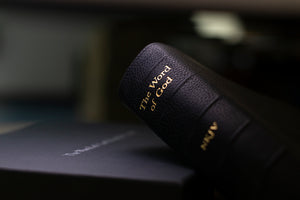Why are high-end Bibles on the rise?
Jul 01, 2019
Years ago, a friend of mine ordered a suspiciously cheap set of Callaway Golf clubs, one of the best and most expensive brands on the market, from an enthusiastic website based in Asia. Upon arrival, it turns out they were, of course, cheap, low-quality copies. They were comically misspelled “Collaway” but might as well have been spelled “throw-away” because that’s what eventually happened to them.
If you ask any serious runner they’ll say the quality of the shoe is superior to the price.
Usain Bolt, world record holder in the 100 meters, 200 meters and 4 × 100 meters’ relay, credits his success to PUMA, saying the shoe brand “made him the legend he is today” and “he wouldn’t choose anything else”. The Puma Complete Theseus II track spike, the sneakers that Bolt used in 2008 during his famous 100m world record race, cost over $150.
The days of buying cheap knock-offs and budget copies are slowly fading. To producers and consumers alike, quality is the new name of the game. That is why Aston Martin, Tesla, Apple, Nike, Rolex, Gore-Tex, Timberlands, all high-quality brands that cost much more than their average counterparts, have a constantly returning customer base that keeps growing annually.
Likewise, a high-quality Bible can last for centuries. In fact, the oldest complete Bibles that we have today (such as the Coverdale Bible and the Geneva Bible) are 500 years old and are estimated to last another millennium. There are several occasions where leather-bound Bibles have been found completely intact after surviving house and car fires that burned everything else to a cinder.[1] These factors might make the depreciation rate (the fact that things lose value over time) of a quality Bible, one of the slowest of all consumer products on the market.
In an effort to make the Bible more available to the younger generations, you can download many e-Bibles for free through apps and websites. You can also purchase cheap low-quality copies of the Bible for as little as $5. Why would you then spend money on a high-quality physical copy? And does the quality of a Bible have anything to do with your devotional life?
Typically, the more expensive a Bible is, the longer it will last because it was built with high-quality materials. A higher quality cover, binding, and paper should last many years longer than a lower quality one. If you want a Bible that will last then it is better to invest a Bible that will go the distance. Otherwise, you'll have to replace a cheaper one because it falls apart. It can be detrimental to your devotional life to have to start over with a new Bible when you’ve spent years highlighting, underlining, writing little notes, promises, and study comments in your old one. With this in mind, it’s best to buy the highest quality Bible you can afford.
So what Bible do you have? One that will last the rest of your life? That you can pass on as a keepsake to your children? Or do you have one that will fall apart next year and you'll toss, losing all of your notes and revelations?
Watch out for our next blog post where we'll be discussing the electronic Bibles!
[1] https://www.wrdw.com/content/news/-Family-holds-to-faith-after-losing-their-house-to-a-fire-477334673.html , https://edition.cnn.com/2016/02/22/us/car-in-flames-bible/index.html


